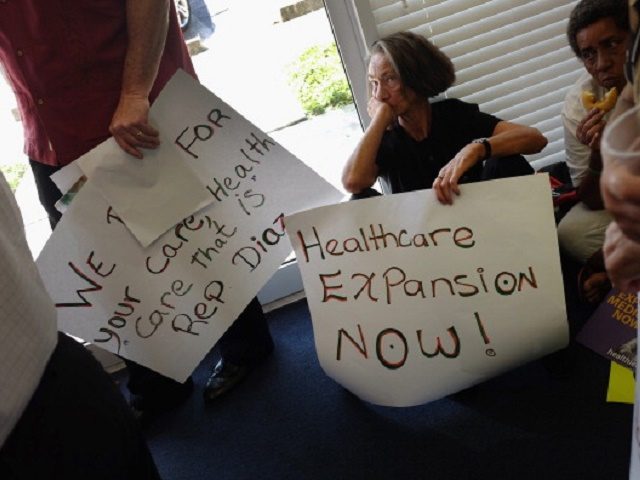A new poll finds that a considerable majority of Texas residents support the idea of expanding Medicaid under Obamacare, despite longstanding opposition from statewide office holders.
Sixty-three percent of Texans now favor expansion, according to a Nielsen poll on behalf of the Houston-based Texas Medical Center Health Policy Institute. The sentiment was captured with 65% of respondents noting that they now pay more in out-of-pocket medical expenses than two years ago. Similar amounts of Texans note that the quality of care has decreased over the same period.
The poll did not explicitly study whether respondents believed that an expansion in Medicaid would address problems with cost and quality of care. The study did, however, find that 32 percent of Texans (the highest amount to date) believe that Medicaid expansion is the best option for achieving universal coverage.
A key driver of the shift in attitudes shows that roughly 32 percent of respondents in Texas identified as Republican, Democrats and Independents apiece. The near-even division of the electorate along party lines will certainly present new challenges for Republican lawmakers to sustain a political edge on the matter without consistent messaging to the contrary of growing popular sentiment. The overall affiliation found in the national poll shows a clear advantage for the Democratic Party with 40% identification as opposed to the GOP’s 28 percent.
Even among Republicans, the idea of expanding Medicaid is not as toxic as one might expect. When asked if a candidate were to support such a proposal, half of GOP voters would consider it a factor to vote for them, whereas 84% of Democrats and 68% of independents would do the same.
Roughly 57 percent of Texans claim that the cost of health insurance is the primary reason for not seeking coverage. Those views are further confirmed when considering developments in the local market over the past two years. In 2015, Blue Cross Blue Shield of Texas (BCBSTX) announced that it would suspend indefinitely its offerings of individual Preferred Provider Organization (PPO) plans and convert policyholders to less-flexible Health Maintenance Organization (HMO) accounts due to unsustainable losses in the wake of Obamacare. BCBSTX posted a $220 million loss for 2015 as incoming premiums failed to compensate for record payouts. Rather than leave the market altogether (like the larger Blue Cross company is considering in North Carolina and has done in New Mexico), the HMO conversion route was taken.
PPO plans have long been considered preferable due to more freedom given to patients in terms of physician choice and access to specialists. HMOs lock individuals into networks requiring referrals for specialist appointments to control costs, however. With BCBSTX’s large-scale switch to individual HMOs, Obamacare’s longstanding promise of “keeping your doctor” was further broken if preferred physicians declined participation in the new plans.
The combination of resistance from healthier individuals to buy in with the unforeseen volume of claims from sicker customers initiated the “death spiral” that has reduced physician choice and spiked premiums to cover costs – just as many in the center-right predicted. Whether Medicaid expansion in Texas or elsewhere will remedy the issue is a tough sell.
Expanding Medicaid in Texas would convert its qualification system from a combination of factors to focus on income alone. Individuals earning $11,880 or less that are disabled or pregnant or $24,300 for a family of four currently qualifies. Under an expansion, individuals earning less than $16,394 or a family of four earning $33,534 would gain access to Medicaid with no further questions asked. While such a move would likely increase access to health coverage – healthcare is a separate matter.
During the 2015 legislative session, physicians groups noted in Austin that Texas Medicaid compensates caregivers only 65 cents on the dollar, compared to Medicare. That deficit, in combination with an option to refuse new Medicaid patients, does little to improve care access and quality.
Texas and 18 other states continue to reject Medicaid expansion plans. Florida, North Carolina, Virginia and Wisconsin remain notable holdouts as well.
A record 56 percent of Texans surveyed claim to have cut back on other personal expenses to cover increasing healthcare costs.
Logan Churchwell is a founding member of the Breitbart Texas team. You can follow him on Twitter @LCChurchwell.

COMMENTS
Please let us know if you're having issues with commenting.